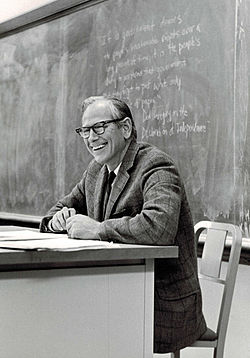Robert A. Dahl Quote
Among the most influential of these was George Mason, who wrote the Virginia constitution and its Declaration of Rights. Responding to the insistent demands of Mason and several others, as well as to similar voices outside the Convention, Mason’s fellow Virginian, James Madison, drafted ten amendments that were ratified in 1789–90 by eleven states, more than a sufficient number for their adoption.
Robert A. Dahl
Among the most influential of these was George Mason, who wrote the Virginia constitution and its Declaration of Rights. Responding to the insistent demands of Mason and several others, as well as to similar voices outside the Convention, Mason’s fellow Virginian, James Madison, drafted ten amendments that were ratified in 1789–90 by eleven states, more than a sufficient number for their adoption.
Related Quotes
About Robert A. Dahl
Robert Alan Dahl (; December 17, 1915 – February 5, 2014) was an American political theorist and Sterling Professor of Political Science at Yale University.
He established the pluralist theory of democracy—in which political outcomes are enacted through competitive, if unequal, interest groups—and introduced "polyarchy" as a descriptor of actual democratic governance. An originator of "empirical theory" and known for advancing behavioralist characterizations of political power, Dahl's research focused on the nature of decision making in actual institutions, such as American cities. He is the most important scholar associated with the pluralist approach to describing and understanding both city and national power structures.
In addition to his work on the descriptive theory of democracy, he was long occupied with the formulation of the constituent elements of democracy considered as a theoretical but realizable ideal. By virtue of the cogency, clarity, and veracity of his portrayal of some of the key characteristics of realizable-ideal democracy, as well as his descriptive analysis of the dynamics of modern pluralist-democracy, he is considered one of the greatest theorists of democracy in history.
He established the pluralist theory of democracy—in which political outcomes are enacted through competitive, if unequal, interest groups—and introduced "polyarchy" as a descriptor of actual democratic governance. An originator of "empirical theory" and known for advancing behavioralist characterizations of political power, Dahl's research focused on the nature of decision making in actual institutions, such as American cities. He is the most important scholar associated with the pluralist approach to describing and understanding both city and national power structures.
In addition to his work on the descriptive theory of democracy, he was long occupied with the formulation of the constituent elements of democracy considered as a theoretical but realizable ideal. By virtue of the cogency, clarity, and veracity of his portrayal of some of the key characteristics of realizable-ideal democracy, as well as his descriptive analysis of the dynamics of modern pluralist-democracy, he is considered one of the greatest theorists of democracy in history.
